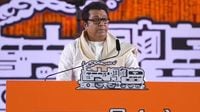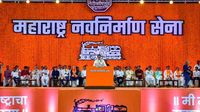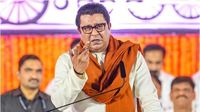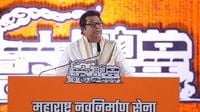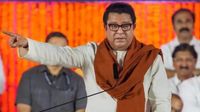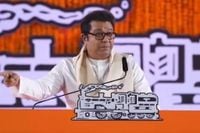MUMBAI: Maharashtra Navanirman Sena (MNS) chief Raj Thackeray on Sunday condemned attempts to incite communal tensions over Aurangzeb's tomb and emphasized that history should not be viewed through the lens of caste and religion. Speaking at his annual Gudhi Padwa rally at Shivaji Park, Thackeray urged the public to refrain from relying on WhatsApp forwards for historical information and instead engage with credible historical sources.
Amid rising tensions surrounding the tomb of the Mughal emperor Aurangzeb, located in Chhatrapati Sambhajinagar district, Thackeray's remarks come in light of demands from right-wing groups for its removal. This controversy has previously sparked protests and violence in Nagpur earlier this month, highlighting the volatile nature of communal relations in the region.
"Don't we want to let the world know that these people sought to destroy the Marathas but were wiped out instead? Stop reading history on WhatsApp and rather delve into history books," Thackeray stated. He emphasized that the socio-political landscape has changed significantly since the era of Chhatrapati Shivaji Maharaj, urging citizens not to be provoked or distracted by divisive narratives.
Thackeray pointed out that Aurangzeb, who spent 27 years in Maharashtra, aimed to eliminate the legacy of Shivaji Maharaj but ultimately failed. "Aurangzeb wanted to kill a thought called Shivaji," he remarked, reinforcing the resilience of historical figures against the Mughal ruler.
In a pointed critique of contemporary cultural influences, Thackeray questioned whether people learned about Sambhaji Maharaj’s sacrifice from films rather than from history books. He specifically referenced the newly released period drama 'Chhaava', which depicts the life of Sambhaji Maharaj, stating, "Hindus who feel awakened after a movie are of no use. Did you learn about Sambhaji Maharaj's sacrifice because of Vicky Kaushal and about Aurangzeb because of Akshaye Khanna?"
Furthermore, Thackeray criticized the reliance on political narratives that exploit historical grievances for personal gain. He remarked that a nation cannot progress based solely on religious identity, citing Turkey as an example of a country that has successfully reformed itself. "Religion should remain within the four walls of your home. A Hindu identifies as a Hindu only when Muslims take to the streets or during riots; otherwise, Hindus are divided by caste," he asserted.
Thackeray also addressed current political issues, claiming that the BJP-led government’s popular 'Mukhyamantri Majhi Ladki Bahin' scheme may be discontinued. "I told you earlier, but you believed them and not me," he said, as opposition parties have criticized the Mahayuti government for failing to increase financial assistance under the scheme from Rs 1,500 to Rs 2,100, as promised in their election manifesto.
In addition to his political critiques, Thackeray reiterated his party's stance on the use of the Marathi language, asserting it should be mandatory for official purposes. "If you live here and don’t speak the language, you will be dealt with appropriately," he warned, emphasizing the importance of regional identity.
Thackeray did not shy away from environmental issues, condemning the pollution of rivers in the name of religious practices. He displayed a video allegedly showing bodies being burnt and disposed of in the river Ganga, questioning, "What kind of religion is this if we destroy our natural resources?" He highlighted that Rs 33,000 crore has been spent on cleaning the Ganga, yet the pollution persists.
He further claimed that Maharashtra's rivers are among the most polluted in the country, with 55 of the 311 most polluted river patches located in the state. "Mumbai had five rivers, and four of them have been killed. The only surviving river, Mithi, is on the verge of dying due to sewage water, encroachments, and chemical waste discharge," he lamented.
Thackeray's remarks resonate with broader concerns regarding communal harmony, environmental degradation, and the political landscape in Maharashtra. As the state grapples with these issues, his call for unity, historical accuracy, and environmental responsibility reflects a need for a more informed and cohesive society.
